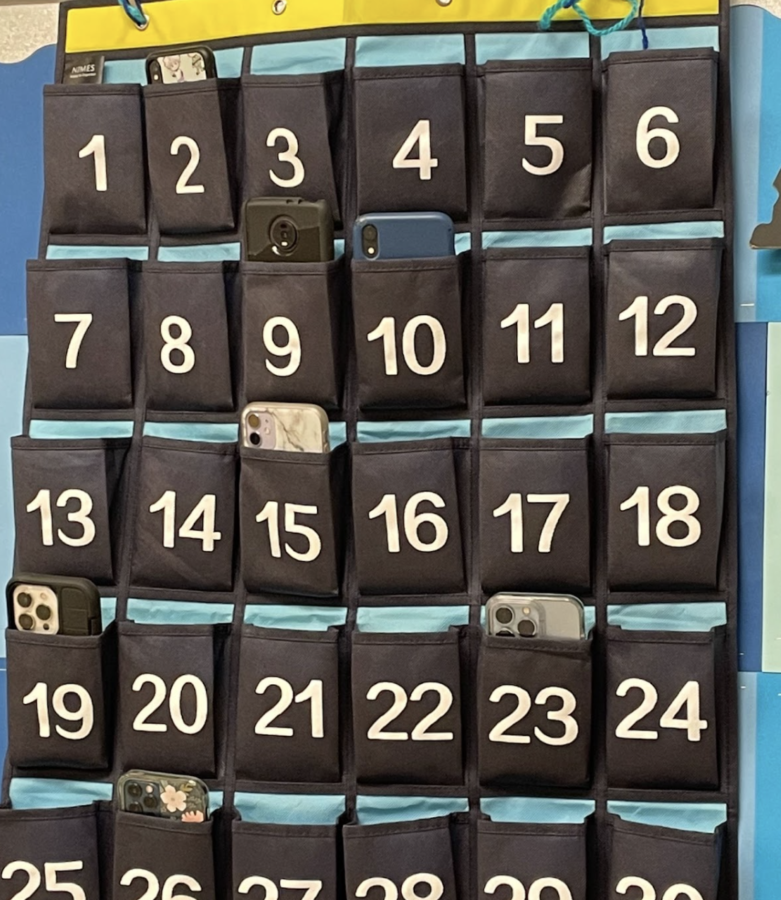Enforcement of the HHS cellphone policy: Too strict?
In modern society, the use of a mobile phone has become necessary as it provides the user with a convenient way to communicate with the rest of the world from anywhere. According to Pew Research Center, this caused the ownership rates of mobile phones in teens to skyrocket, from 45% in 2005 to a whopping 85% present day.
The increment in mobile phone ownership ultimately makes school and outside life safer and more convenient for teens. However, there are downsides to mobile devices; unnecessary distractions, which drastically decrease attention span, self-confidence, and other crucial mental traits that are naturally found in the human mind.
This is the main reason why the cell phone policy is now being enforced at Highlands High School (HHS), because just like in any society if a minority group causes a large-scale issue, the easiest solution for the people in charge is to enforce the complete prohibition of the practice that causes the problem. There is always a more complicated way of solving the issue, which would require the cooperation of the people in charge but would result in a much more effective and suitable solution for everyone.
According to the HHS handbook, In this case, it would require students to somehow be identified as responsible or not, which would already be an extremely inaccurate procedure, and then obtain a signature from their legal parent or guardian, meaning that an official document would have to be produced that allows for an exception in a school board guideline.
Most students in HHS are not of legal age yet, meaning that they aren’t considered capable of making their own decisions. Therefore, when the student is at school, the school is responsible for their safety and education, meaning that the school is authorized to give the students strict rules on what they may or may not do. The school decided prohibiting cell phone use was the best option for students.
The reason for the new rule is a combination of ethical choices and legal guidelines. Assistant Principal Jennifer Forgy shared feedback she received about the cell phone policy.
She said, “Most students have just asked me questions about it, but few have complained. When I ask students whether it has helped them be on task, the ones being honest have said yes.”
Some students who do not pay attention in class because of their phones have admitted that the new policy was a tough pill they were forced to swallow.
An interviewed senior mentioned, “Yes it has, 100 percent. The phone pockets make it much easier to focus because there are fewer distractions because there aren’t any notifications.”
Forgy also mentioned that the school isn’t just an educational institution, but also a place where students’ education is truly cared about.
“100 percent, I love every one of the students in this school whether they are good, bad, or indifferent.”
This is the ethical contribution of the cell phone policy; the school’s caring attempt to get students immersed in their own education. The school does not believe in scaring students into education but rather chooses to go the extra mile and reorientate the student’s view of priority towards education so that they voluntarily study.
“Sometimes when a student is distracting others, it becomes a disciplinary manner, so you can take them out into the hallway and talk to them, usually this gets them to work, but with redirection, you can certainly get them back on task,” She said.
The school doesn’t have the primitive idea of “smart” or “dumb” students, because everyone has their own lives and perspectives to view a situation, so estimating the quality of a student from the perspective of a teacher would be inaccurate and could actually negatively impact the student’s motivation to learn. This is where the cell phone policy’s guidelines get a little unclear.
The legal half of the cell phone policy’s guidelines are based on the first option that comes to mind when solving a societal issue: strict prohibition. This is the currently implemented solution in HHS. Although the solution effectively solves the issue, it is not suitable for everyone, such as students who can responsibly use their cell phones during class.
Is the HHS cell phone policy too strict? Yes and no. It isn’t the most suitable option for everyone, but when it comes to solving the problem quickly and easily, option 1 is superior to option 2 in every way. And because the school is responsible for the education of the student, allowing the student access to a cell phone during class is a limited privilege that contradicts the ultimate goal of education. So regardless of whichever perspective this situation is seen from, it has to be accepted that the current solution is the only ethically correct way to enforce the students’ education.
Your donation will support the student journalists of Highlands High School. Your contribution will allow us to cover our annual website hosting costs.



